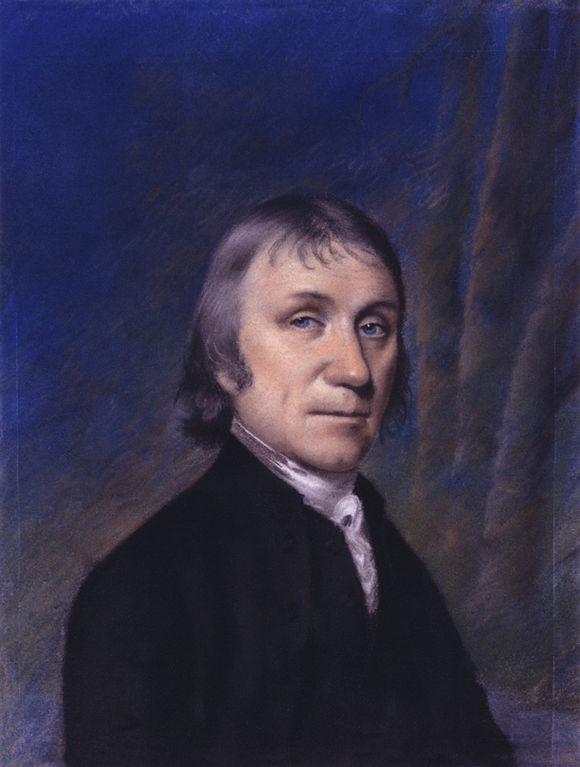| Joseph Priestley | |
|---|---|
 |
|
| Theologian | |
| Specialty | Chemistry, education, political theory, theologian |
| Born | Mar. 24, [O.S. Mar. 13] 1733 |
| Died | Feb. 6, 1804 |
| Nationality | English |
Joseph Priestley was an English polymath. He was particularly prominent in theology, politics, education, and chemistry. He made more than 150 publications, and he was the man who first isolated gaseous oxygen. Priestley’s scientific standing was somewhat diluted later in life when he refused to move away from the increasingly discredited phlogiston theory and toward modern a modern understanding of the basic building blocks of chemistry.
His outspoken political views, particularly his support for the French Revolution, also brought him enemies, including within the ranks of British royalty.
Priestley’s Early Years
Priestley was born in Leeds in 1733 into a textile-working family. When he was seven, his mother died, and he went to live with his aunt. Priestley was sent away to grammar school but had to return home due to illness. He continued his studies locally and became an exceptional student.
By his teens, he was already well versed in philosophy, physics, and mathematics, and able to speak a number of languages. His health gradually improved, and he was able to enroll at Daventry Academy, a nonconformist establishment in Northamptonshire. During his time there he concentrated on philosophy, science, and history. He was much taken by the writings of David Hartley.
Career Beginnings
In 1755, Priestley began his vocation as a minister in Needham Market, moving to the Cheshire town of Nantwich three years later. He set up a minor school of his own, where he put into practice some of his own ideas: he believed that humanity’s quality of life could be advanced by means of science.
In 1761, he took up a post as tutor at another nonconformist school, Warrington Academy. Here, he wrote his first book – Liberal Education for Civil and Active Life – in which he stated that subjects such as arts, sciences, and history were of more use than classical studies to prepare students for industrial or commercial careers.
Priestley followed this up with a book emphasizing the importance of scientific history, then became interested in politics, publishing a book on this subject in 1768. He was a strong supporter of civil liberty, and his statement that a state should act according to what brought its members “good and happiness” was the spark that led to the development of utilitarianism by Jeremy Bentham.
By now, Priestley’s works had come to the attention of Benjamin Franklin and Richard Price, and the three men became friends. Their lengthy discussions resulted in a 1774 pamphlet which castigated the British state for not allowing the American colonists their due rights.
Priestley’s Radical Politics
The political beliefs that Priestley espoused made him unpopular with his government, while his unorthodox religious views caused the Church to view him with suspicion. In two books he published in the 1780s, he set out some radical ideas, including doubting the truth of the Holy Trinity and the Virgin Birth.
These beliefs, which formed the basis of Unitarianism, were seen as atheistic by a number of people, including King George III. Priestley went to Birmingham and met a number of the Midlands’ prominent figures, including James Watt and Josiah Wedgwood. He joined the Lunar Society, and it was then that he made important scientific breakthroughs, including the isolation of oxygen and work on gaseous diffusion.
In 1791, Priestley brought even more hostility upon himself when he put out a pamphlet in support of the revolutionaries in France. He believed that his longed-for “empire of reason” had been brought nearer by events across the Channel, but the associated prediction that the role of monarchy would inevitably change so that they were “servants of the people” upset the British King. The traditional royal parties were especially upset by Priestley’s insistence that they would henceforth have to be accountable to the people they ruled, rather than the other way around.
Later the same year, Priestly wrote a further political work in which he put forward ideas similar to those Thomas Paine had expressed in the Rights of Man. He went further and formed a Birmingham Constitutional Society; local Tories made rabble-rousing speeches against it and Priestley’s own house was ransacked.
Legacy and Death
As a result, he moved to London and taught in Hackney for a while, but hostility toward him continued and in 1794 he emigrated to Pennsylvania, where he wrote chiefly on Unitarianism, establishing America’s first Unitarian Church. He died at home in 1804, having suffered from ill health for three years.